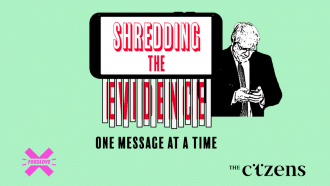Democracy can’t work like this. We’re not giving up.
We have an update on the WhatsApp government case.
BUT FIRST: thank you to the thousands who signed our petition about disappearing messages and donated to the crowdfunder. This issue is still live – and adding your name to the petition still really helps. Please join us:
If the government repeatedly violates its own messaging rules – governing by WhatsApp and repeatedly losing inconvenient texts – when should the courts step in?
In our case with The Citizens, we said the time was now. Unfortunately, the judges disagreed.
The Court accepted that there is widespread rulebreaking across government. There was no answer to our case on the facts, so the government didn’t try. It just said there was nothing the Court could do – and the Court has agreed.
But we’re not stopping here. We have been given permission to appeal.
We’re proud to have focused debate on the loss of key public information over WhatsApp and similar services. Everyone from Parliamentary Committees to the nation’s archives to the Institute for Government have now said that WhatsApp Government is a democratic threat.
As a reminder, here’s what this case taught us:
- The government routinely flouts its own rules on WhatsApp
From the debates over discharging patients into care homes to Johnson’s Lost Partygate Texts, important conversations took place over WhatsApp and were thrown in the bin. The government even admitted in the case it doesn’t follow its own rules. Or as the judgment said at para. 33:
It is common ground that some Ministers, civil servants and unpaid Government advisors have: (1) used private email accounts for communications that relate to Government business; (2) used instant messaging platforms such as WhatsApp on private devices for such communications; and (3) made use of auto-delete functions.
So it had to persuade the court that it was not behaving unlawfully but simply breaking ‘minor’ rules. You can form your own view whether these debates are tittle-tattle of no public interest. We certainly don’t think so.
2. This is part of a wider pattern of the government dodging scrutiny
Neither people nor parliament can hold government to account if the receipts go missing. Democracy can’t work if the government dodges scrutiny.
That’s also the premise of yesterday’s scathing report from the Public Administration and Constitutional Affairs Committee that slams “evidence of poor FOI administration in the Cabinet Office and across government which appears to be inconsistent with the spirit and principles of the FOI Act.”
The record is clear: officials are seeking to avoid scrutiny of their decisions. This is totally caustic for public life and democratic politics.
3. This is an area of major public concern
Tens of thousands of you signed a petition demanding the government keep the people’s receipts. Dozens of news stories criticised the government’s loss of key texts about corporate lobbying, Covid response, and more.
Everyone from the Institute for Government to the nation’s archive libraries now, thanks to our work with The Citizens, see this is an issue.
Until today, Foxglove had never lost a judicial review. But we have to take cutting-edge cases to drive debate forward. Always winning would mean we were being too conservative.
Still, we’re disappointed by today’s result, given the scale of rulebreaking this case exposed across government.
We aren’t giving up. To win this battle, we’ve got to keep the pressure on. We’ll keep you posted. If you haven’t signed yet, please add your name here:

